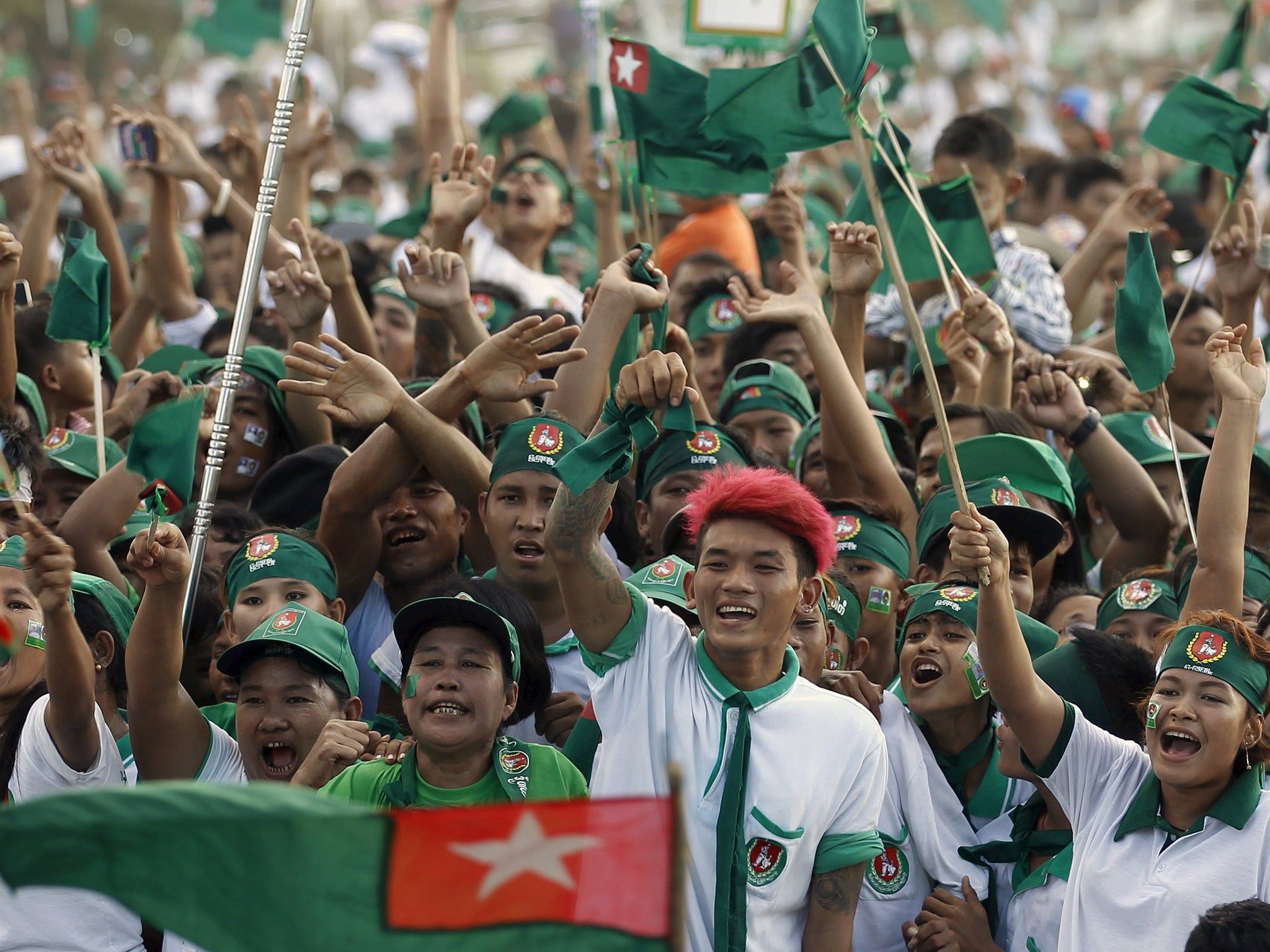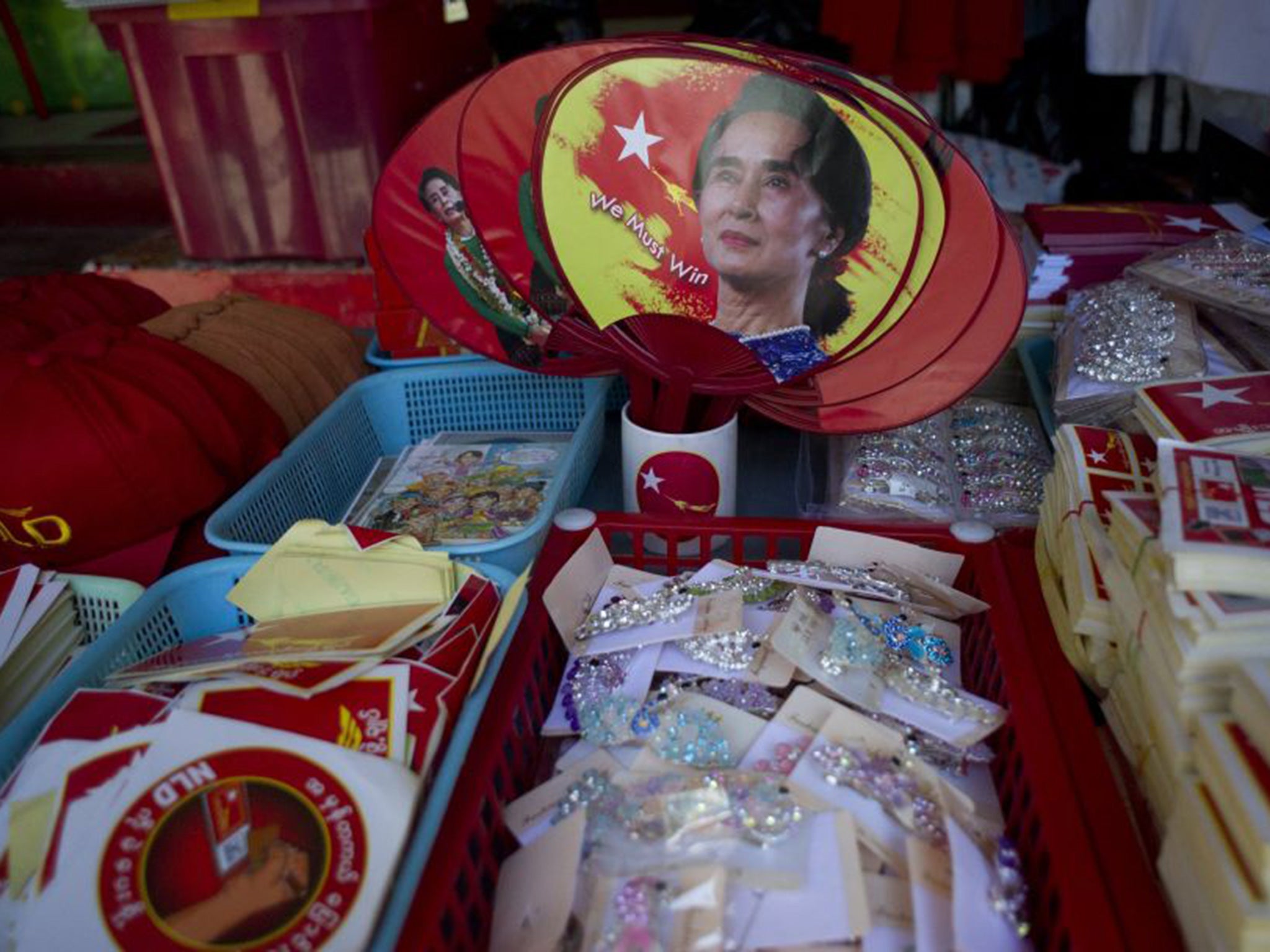Burma elections: The former Aung San Suu Kyi supporters standing against NLD candidates
As Burma prepares for its most important election in a generation, Peter Popham in Rangoon talks to former supporters of opposition leader Aung San Suu Kyi who are unhappy with her party’s methods

Born and raised in one of Rangoon’s poorest slums, U Myo Khin, aged 57, has been a political activist all his adult life. When Aung San Suu Kyi and her colleagues launched the National League for Democracy in September 1988, he was a volunteer worker from day one. He paid for his activism with a total of 12 years in jail.
But on the threshold of Burma’s most important general elections in half a century he is an ex-member: contesting his constituency of Yankin, the slum where he still lives, as an independent, fighting the NLD candidate. After more than 23 years of struggle for the party, he has quit in deep disillusionment.
“Activists like me sacrificed our blood, sweat and tears for the party over many years,” he told The Independent. “But we’ve been marginalised.”
In preparation for Sunday's elections, the NLD’s central committee established strict criteria for choosing candidates: they should have experience in the party, enjoy local support and have political gifts. Younger candidates were preferred over older ones, women over men, and people from the ethnic minorities over Burmans.
But in practice, he said, these benchmarks were frequently ignored: what counted was cosy relations with the party’s grandees, or willingness to obey orders, or both.
[Suu Kyi] cannot relate to ordinary people
“I satisfy four of the benchmarks,” he said. “My rival has no experience in the party, and he’s 10 years older. But he is very close to people on the central committee. That’s why they picked him.” On 1 August he resigned from the party.
And he is far from being the only one. At her press conference on Thursday, Ms Suu Kyi defended the party’s decision to reject prominent activists from outside the party – including members of Generation 88, a group which guided successive struggles against military rule – as party candidates because those with loyalty and long experience inside the party were preferred. But other potential candidates, some with long years in the party and high local profiles, have been turned down, too.

One is Daw – the honorific for a married woman – Khin Phone Wai, from a poor quarter next to Yankin, who like Mr Myo Khin left the party when she was turned down as a candidate. Now she says that Ms Suu Kyi is out of touch. “She cannot relate to ordinary people,” she told the New York Times. “People are facing hardship every day, and she can’t feel their needs. She’s not in touch with the people at the bottom.”
Another one passed over was Daw Nyo Nyo Thin, who as a local politician gained a reputation for exposing and fighting corruption in big Rangoon construction projects: she was dropped from the NLD’s candidate list in August and like Mr Myo Khin is contesting as an independent against the NLD candidate.
“This is a general problem in the party,” Mr Myo Khin said. “The great majority of people who fought for the party’s survival during its years of crisis have been marginalised. Twenty per cent of them survive because they are yes men, willing to toe the party line. Nearly all the strong candidates have been rejected.”
His claim feeds the suspicion which recent remarks by Ms Suu Kyi have raised: that she considers loyalty and docility more desirable in candidates than political vigour or independent thought. At last Sunday’s party rally in Rangoon, she told the crowd: “Don’t criticise our candidates, only focus on the [party] flag. Our duty is to serve, your duty is to vote.”
In August she made a similar point to Radio Free Asia. “The responsibility of the people is simply to vote for the party, not the name of the candidate,” she declared. “The NLD is a political party and we have rules. If you can’t follow these rules you can’t work for the NLD.” That sort of imperiousness is driving people away. Her comments at this week’s press conference about planning to rule “above the President” have made matters worse.
“Suu Kyi is authoritarian,” Mr Myo Khin said bluntly. “The goal is democracy, but their way of trying to achieve it is authoritarian.” He related how more than 100 party members in towns north of Rangoon complained about constituency candidates. “The following day they were all expelled.” A party source who declined to give his name confirmed the mass expulsion.
Ms Suu Kyi’s refusal to reveal who she has chosen as the party’s presidential candidate also rankles. “We are close to a historic election,” he pointed out. “Everyone wants democracy, which means transparency. But the leader of our democratic party has no transparency – she and her central committee have never announced who is the presidential candidate.”

Mr Myo Khin lives with his family in a small, ramshackle clapboard house, deep within the labyrinthine lanes of Yankin. This is the Rangoon the tourists never see: startlingly poor and congested, alleys too narrow for anything wider than a bicycle rickshaw, children playing under the stilts of their homes among the neighbourhood cats and chickens. Mr Myo Khin has done no paid work since throwing himself into political work 27 years ago: instead his heroic wife Daw Khin Khin Win became the breadwinner in between bearing five children, and supported him through his spells in six different jails around the country.
“We talk about politics together,” she said, sitting in their tiny front room with her husband while a grandson watched Cartoon Network in the background. She supported all his political activity. “When he went to jail for the first time, I joined the NLD. We left the party on the same day.
“When my husband was first in jail, the children were very young,” she went on. “We struggled to survive as a family, it was a very tough for us, but it’s not surprising for people in political struggle. Now I look back and I am very proud of our family. We made every effort for the benefit of the people. And we got a lot of support from our neighbours. I have no particular hopes for my family but I hope things will improve for the township, and that they will get better education and health care.”
Life in the lanes has improved in the five years since Ms Suu Kyi came out of house arrest. Outside the township a new road has been built, and the previously fitful electricity supply has become dependable. But the struggle goes on: the government announced with a flourish that primary schooling would be free – but then the teachers, very poorly paid, demanded informal payments from parents, ranging from 8,000 Kyats (£4) per month in primary school to 100,000 Kyats (£50) per month in secondary school. Today this family’s only breadwinner is their second daughter, who works in a company and brings home 300,000 kyats (£150) per month. It’s no surprise that life remains very tight.
But Mr Myo Khin’s passion is undiminished. “I love truth and justice,” he said. “I trusted my leader and my party. Now the decisions they are taking are not fair. I don’t want to see injustice succeed. That’s why I am standing for Parliament. There should be people in Parliament who love justice.”
How the election works
Burma holds its first free elections in 25 years tomorrow, after five decades of military rule. The 1990 elections, won by Aung San Suu Kyi, were annulled and she was placed under house arrest.
The candidates
More than 6,000 candidates in 91 political parties are competing for 498 seats in Burma’s upper and lower parliament. It will come down to the ruling Union Solidarity and Development Party, which is backed by the army, and the National League for Democracy (NLD), headed by Ms Suu Kyi.
The electorate
There are 30 million voters on the official register. But there are concerns that these include dead people, and exclude some of the living, notably 500,000 Rohingya Muslims who are not allowed to become citizens.
The outcome
A quarter of the seats are a foregone conclusion as they are automatically allocated to the military. The NLD will therefore need two-thirds of the remaining seats – a landslide – to win a majority.
The president
Burma’s constitution forbids a president with a foreign-born spouse or children, thus excluding Ms Suu Kyi. She has said that she “will be above the president” if the NLD wins.
Join our commenting forum
Join thought-provoking conversations, follow other Independent readers and see their replies
Comments